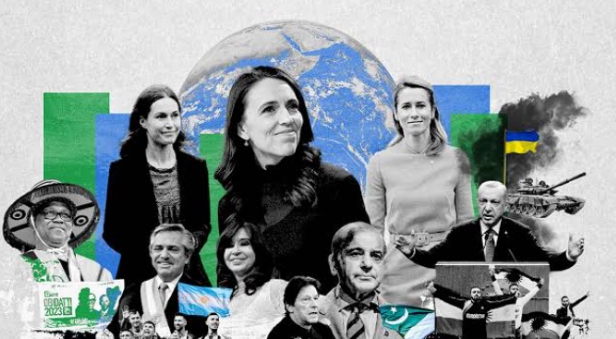Global Waves of Power:Looking through the Navigation of Critical Elections in 2024
By Adeyemi Adekunle

Looking ahead to the year 2024, it is evident that the world is about to experience a significant political shift. More than 60 nations from various regions of the world are preparing for national elections.
These countries represent about half of the world’s population, with diverse cultures, political ideologies, and socioeconomic backgrounds.
The outcome of these elections will have far-reaching consequences for global politics and will significantly impact the world’s future. Therefore, it is crucial to pay close attention to the events that will unfold in the run-up to these elections, including the candidates’ campaigns, the issues they will address, and the political alliances they will form.
By doing so, we can better understand the political climate, anticipate the changes that may occur, and prepare ourselves to navigate through the challenges that lie ahead.
The implications of these elections are far-reaching, as they will not only affect the countries directly involved but also have an impact on the global community.
From economic policies to foreign relations, the choices made by these nations will shape the world we live in for years to come. As such, it is essential that we stay informed and engaged in the political process, as the future of our world depends on it.
This monumental wave of democratic participation is currently taking place on a global scale, and has the potential to bring about significant changes in the political landscape.
The outcome of six key elections, which have captured international attention, could very well determine the direction in which the balance of power shifts.
This level of participation and engagement from citizens is unprecedented and suggests that people are becoming increasingly aware of the importance of their voices in shaping the world around them.
It is also a testament to the strength of democratic values, and the belief that collective action can lead to positive change.
United States: A Clash of Worldviews
The political landscape in the United States is currently dominated by a contentious debate between isolationist and globalist factions.
At the heart of this debate lies the question of America’s position in the international arena – should the country prioritize its own interests above all else, or engage actively with the rest of the world?
This issue has become even more pronounced under the leadership of former President Donald Trump, whose “America First” agenda has been met with both praise and criticism.
The current approach to foreign policy adopted by the government has the potential to bring about significant changes in the country’s relationship with the global community. It is being closely monitored and analyzed by experts and policymakers to assess its impact on the world stage.
The implications of this approach could be far-reaching, affecting not only diplomatic relations but also trade, economy, and security. The government’s stance on key issues such as human rights, climate change, and geopolitical tensions is likely to shape its foreign policy decisions and determine its place in the international arena.
A stark contrast emerges between Trump’s ambiguous stance on critical issues and Democratic incumbent Joe Biden’s commitment to supporting allies in the face of global conflicts.
Taiwan: A Semiconductor Giant’s Struggle for Independence
The small yet influential island of Taiwan finds itself at the epicenter of a struggle for independence, its fate intertwined with global economic dynamics.
As tensions rise between Taiwan and China, the elections become a battleground where disinformation and geopolitical manoeuvring could shape the future.
The world watches closely, recognizing the potential impact on international relations and the delicate balance in the Asia-Pacific region.
Russia: The Unyielding Grip of Putin’s Agenda
In the aftermath of the Ukraine invasion, Russia stands as the most sanctioned country on Earth.
The 2024 elections raise questions about the continuation of President Vladimir Putin’s autocratic policies and their implications for global conflicts.
The choice of America’s leader becomes a wildcard in determining the trajectory of the Ukraine-Russia war, with potential shifts in strategy depending on the occupant of the White House.
European Union: Navigating Populism and Global Relations
As the European Union heads to the polls, the specter of populism looms large. Anti-immigration sentiments and differing approaches to Russia and China set the stage for a decisive election.
The balance of power within the EU hangs in the hands of voters, influencing the future of relations with key global players.
The reelection bid of Ursula von der Leyen becomes a critical factor in maintaining stability and unity amid growing populist currents.
India: Modi’s Controversial Leadership Under Scrutiny
In India, Prime Minister Narendra Modi faces criticism over alleged persecution of religious minorities, yet the bond between India and the U.S. remains resilient.
The 2024 elections become a litmus test for Modi’s leadership, with implications for India’s role as a regional counterweight to China.
Shared concerns about China’s ascent bind the two nations, irrespective of internal challenges and criticisms of Modi’s government.
South Africa: ANC’s Uncertain Future
South Africa stands at a crossroads as the ANC, in power since 1994, faces the possibility of losing its outright majority. Economic challenges, unemployment, and power shortages contribute to a shifting political landscape.
The potential formation of a coalition government adds a layer of complexity, with implications for international relations and economic partnerships, particularly with China and the West.
Year of Disinformation: AI’s Impact on Global Democracy
Amidst these critical elections, the specter of AI-driven disinformation casts a shadow over global democracy.
Experts warn of the potential consequences as voters grapple with manipulated images and sounds. Russia, Iran, and China emerge as key players in election interference, utilizing social media to propagate disinformation.
The role of social media companies comes under scrutiny, raising concerns about the preservation of reliable news as a cornerstone of global democracy.
In this pivotal year, the world watches as nations navigate the intricate web of geopolitics, democracy, and the evolving landscape shaped by the choices made at the ballot box.

A Nigerian trained investigative journalist, who cover various news beats in Nigeria.









